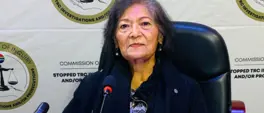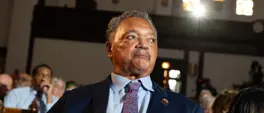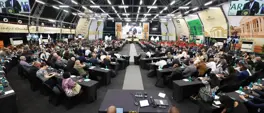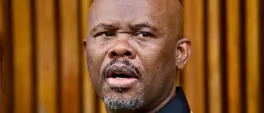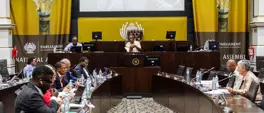OPINION: Love thy neighbour - A call for less xenophobic narratives around structural issues
Deepna Desaia and Bwanika Lwanga
24 January 2025 | 11:15When xenophobia destroys the most basic community improvement efforts, nobody wins except those who profit from chaos and division, write Bwanika Lwanga and Deepna Desai.
The liberation of any country is impossible without the solidarity of its neighbours.
The miracle of the South African democratic order would be impossible without the commitment and solidarity from countries all over the world, and Africa in particular, where freedom fighters sought refuge and trained for military combat.
All significant role players in the struggle for freedom can tell a story of crossing borders and the radical love of siblings from all over the continent, which sustained and eventually led to the freedom we are charged with maintaining today.
Today, a growing sense of South African exceptionalism has given rise to a distorted narrative about foreign nationals - one that disregards historical ties and damages South Africa's relationships with other African nations. This misguided view has sparked unjustified hostility toward immigrants living within our borders.
As the social dynamics roll into 2025, it is timely to call for more circumspect public discourse around, amongst other things, the relationship between the country and African foreign nationals in particular.
To get to the core of the prevailing socio-economic issues in the country, it is important that we guard against participating in degenerative practices that lead to hostility in communities.
These harmful narratives corrode important parts of our social contract, and reverse important mechanisms which are built on solidarity and a genuine interest in an equitable society.
In a recent mediation conducted by one of the authors between two long-standing community leaders in Alexandra, the central source of conflict happened to be the attitudes of some participants in a community project that served to fill crucial gaps in governance and service delivery in the community.
In this regard, community members had historically collaborated to maintain recreational parks, engage at-risk youth, create marketplace opportunities for local vendors, and spearhead cleanup efforts along the polluted Jukskei River.
However, the aforementioned has come to a halt, despite years of successful collaboration.
Not only have the life chances of a significant number of people been impacted, but the xenophobic tensions emanating from divisive narratives eventually forced one leader to flee the country altogether.
This case starkly illustrates how a particular brand of xenophobia undermines the very community bonds needed to address local challenges, which are partly systemic and not caused by the often poor, African and vulnerable foreign nationals who find themselves on the receiving end of the ultimate manifestation of the discourse around immigration, jobs, and service delivery.
A nuance which ought to be appreciated is the fact that the issues attributed to migratory patterns are largely structural issues.
Spatial injustice, unemployment and fading prospects of an egalitarian society, although in some instances perpetuated by immigration dynamics, are not caused by the immigration patterns.
On the one hand, xenophobic attitudes seem to flare into upheaval when the government of the day is failing to honour its mandate. On the other hand, xenophobic attitudes dominate the popular narrative when questions around racialised economic segregation enter the public domain.
Accordingly, one can understand xenophobic flares as a pressure release mechanism deployed to distract from the prevailing structural issues that cause drug abuse, unemployment, crumbling infrastructure, the lack of service delivery, and spatial inequality.
When xenophobia destroys the most basic community improvement efforts, nobody wins except those who profit from chaos and division.
Every rand spent rebuilding vandalised property is a rand that could have gone to youth programs, job training, or drug rehabilitation.
This social fabric that took significant sacrifice to build is unravelling at an alarming rate due to a refusal to correctly frame the causes of the issues faced by South African societies.
When community leaders who once worked together to build parks and markets can't even sit in the same room because of xenophobia, we're facing a crisis that threatens to destroy important social protections that ought to be defended, given the direction some areas of our society seem to be going.
This has resulted in well-meaning South Africans having to practice Ubuntu under difficult circumstances when trying to maintain social relations with foreign nationals.
Another year of this reality builds dangerous momentum towards what can become an irreparable wedge in social relations between South Africa and the rest of the region.
All this to say, it is important to recognise the source of social decay and engage them robustly. Blame, responsibility and resource allocation ought to be proportional. Where any role-player has undermined the law or parts of the social contract that has been agreed upon, such role-players ought to be processed in accordance with the law.
Again, this perspective does not excuse foreign nationals who engage in misconduct. However, it emphasises the importance of accurately diagnosing the problems and appropriately allocating energies and resources.
The most commonly used mechanism of all oppressive regimes is that of divide and rule. At this juncture in the life of this country and this continent, the words of Nelson Mandela at the OAU summit of the heads of state and Government of 1994 ought to serve as a guide to traverse the current affairs:
When the history of our struggle is written, it will tell a glorious tale of African solidarity, of African's adherence to principles. It will tell a moving story of the sacrifices that the peoples of our continent made, to ensure that that intolerable insult to human dignity, the apartheid crime against humanity, became a thing of the past. It will speak of the contributions of freedom - whose value is as measureless as the gold between the soil of our country - the contribution that all of Africa made, from the shores of the Mediterranean Sea in the north, to the confluence of the Indian and Atlantic Oceans in the south. Africa shed her blood and surrendered the lives of her children so that all her children could be free. She gave of her limited wealth and resources so that all of Africa should be liberated. She opened her heart of hospitality and her head so full of wise counsel, so that we should emerge victorious. A million times, she put her hand on the plough that has now dug up the encrusted burden of oppression that had accumulated for centuries.
Xenophobia is an unAfrican and shallow act of distraction and ought to constantly be characterised as such. It undermines the very principles of solidarity and unity that were pivotal in the struggle against apartheid and the broader fight for freedom across the continent.
The current xenophobic attitudes not only distort the historical narrative, but also threaten to unravel the social fabric that has been painstakingly built over decades.
As we enter 2025, our approach to the country’s issues will require public opinion to be more considered and multi-faceted.
It is crucial to tackle the root causes of the public sentiments we express and insist on fair and constructive dialogue on social issues such as these.
Deepna Desai is a community activist and corporate commercial attorney. Bwanika Lwanga is a corporate and commercial attorney and a columnist with an interest in African regional issues.
Trending News
More in Opinion
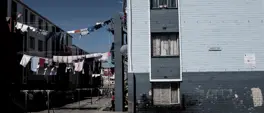
13 February 2026 10:24
JAMIL F. KHAN | Crime is not the disease, it’s the inheritance

13 February 2026 04:28
MANDY WIENER | Ramaphosa meets the moment on water and crime, but lived experiences will be the measure

12 February 2026 09:49
JUDITH FEBRUARY | SONA 2026: Ramaphosa faces a defining test of leadership and the rule of law




